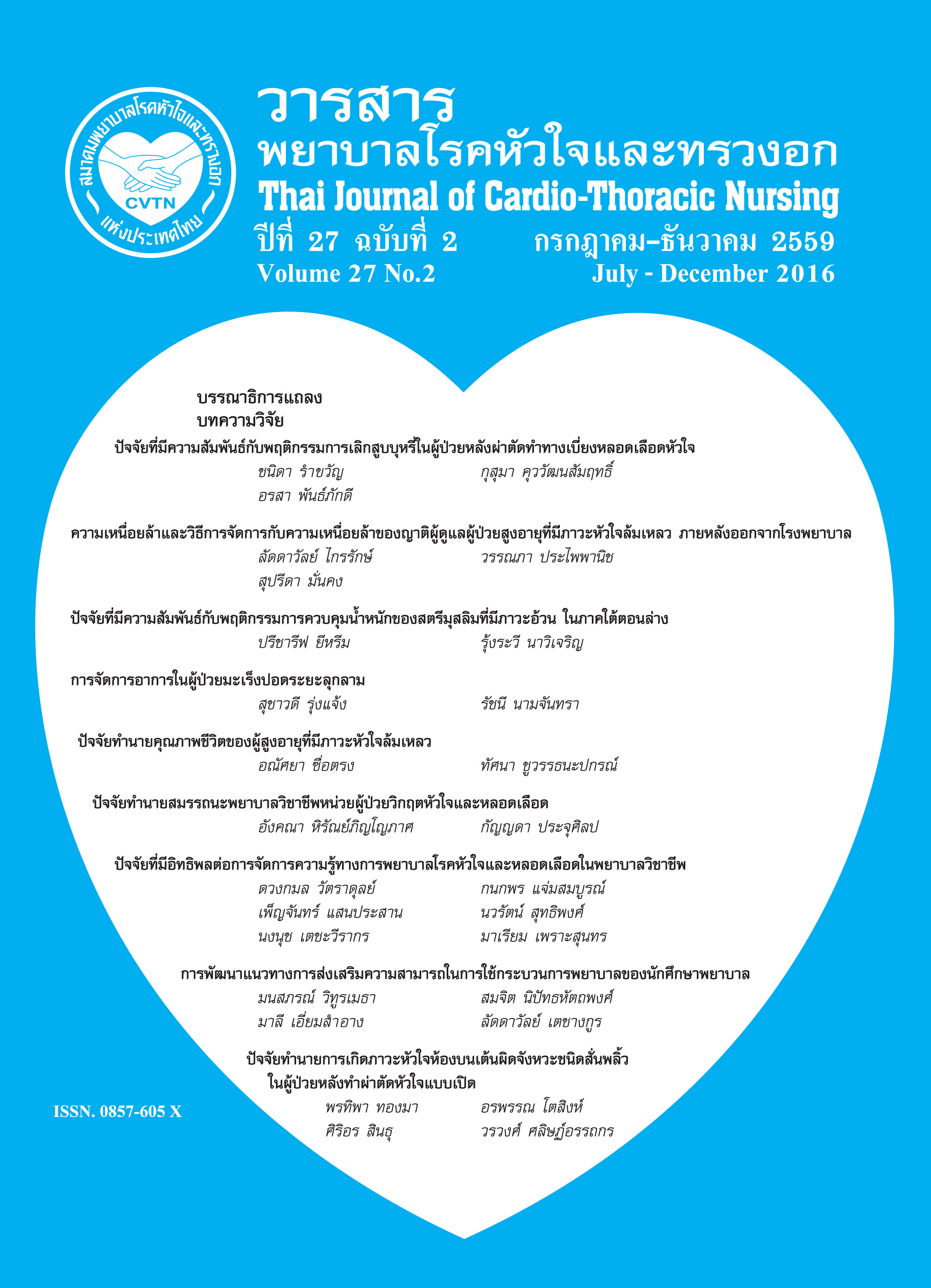ความเหนื่อยล้าและวิธีการจัดการกับความเหนื่อยล้าของญาติผู้ดูแลผู้ป่วยสูงอายุที่มีภาวะหัวใจล้มเหลวภายหลังออกจากโรงพยาบาล
Keywords:
ญาติผู้ดูแล, ความเหนื่อยล้า, การจัดการกับความเหนื่อยล้า, ภาวะหัวใจล้มเหลว, family caregiver, fatigue, fatigue management, heart failureAbstract
การศึกษาครั้งนี้เป็นการวิจัยเชิงบรรยาย เพื่อศึกษาความเหนื่อยล้าและการจัดการกับความเหนื่อยล้าของญาติผู้ดูแลผู้ป่วยสูงอายุที่มีภาวะหัวใจล้มเหลว โดยใช้ทฤษฎี The Theory of Unpleasant Symptoms และ Model for symptom management เป็นกรอบแนวคิดในการศึกษา กลุ่มตัวอย่างเป็นญาติผู้ดูแลผู้ป่วยสูงอายุที่มีภาวะหัวใจล้มเหลวที่จำหน่ายออกจากโรงพยาบาลไปแล้วอย่างน้อย1เดือน คัดเลือกกลุ่มตัวอย่างแบบเฉพาะเจาะจง ตามคุณสมบัติที่กำหนด จำนวน 100 คน เครื่องมือเก็บข้อมูล 4 ส่วน ประกอบด้วย 1) แบบบันทึกข้อมูลทั่วไปของผู้ป่วย 2) แบบบันทึกข้อมูลส่วนบุคคลของญาติ 3) แบบสอบถามความเหนื่อยล้า และ 4) แบบสอบถามการจัดการกับอาการเหนื่อยล้า วิเคราะห์ข้อมูลโดยใช้สถิติเชิงบรรยาย
ผลการวิจัยพบว่าญาติผู้ดูแลทั้งหมดมีความเหนื่อยล้าหลายระดับ โดยส่วนใหญ่มีความเหนื่อยล้าระดับปานกลาง มีการจัดการกับความเหนื่อยล้าโดยการไม่ใช้ยา และการใช้ยาร่วมกับการไม่ใช้ยา สำหรับการจัดการความเหนื่อยล้าโดยการไม่ใช้ยามีหลายกิจกรรมร่วมกัน ซึ่ง 5 กิจกรรมที่ใช้มาก ได้แก่ การพูดคุยกับคนรู้ใจ การนอนหลับ/พักผ่อน การทำสมาธิ การฟังดนตรีและการออกกำลังกาย กลุ่มตัวอย่างใช้วิธีต่างๆในการจัดการกับความเหนื่อยล้าให้เหมาะสมตามสถานการณ์และอาการที่เกิดขึ้น แหล่งข้อมูลของการจัดการโดยไม่ใช้ยาขึ้นอยู่กับวิธีจัดการด้วยตนเองตามอาการและวิธีการของตนเอง โดยได้ความรู้จากแผ่นพับหรือหนังสือ ญาติผู้ดูแลจัดการกับความเหนื่อยล้าโดยการใช้ยาร่วมด้วยนั้นใช้แหล่งข้อมูลส่วนใหญ่มาจากแพทย์และพยาบาลโดยคำนึงถึงการใช้ยาในขนาดที่เหมาะสม กลุ่มตัวอย่างทั้งหมดคิดว่าการจัดการกับตนเองช่วยให้ความเหนื่อยล้าลดลงและช่วยให้รู้สึกสบายใจมากขึ้น กลุ่มตัวอย่างทั้งหมดปฏิบัติกิจกรรมการจัดการกับความเหนื่อยล้าที่บ้าน
ผลการศึกษาแสดงว่าญาติผู้ดูแลผู้ป่วยมีความเหนื่อยล้า พยาบาลควรวางแผนการพยาบาลเพื่อป้องกัน ช่วยเหลือและแก้ไขการเกิดความเหนื่อยล้าของญาติผู้ดูแล
Fatigue and fatigue management of family caregivers caring for older adults with heart failure post discharge
This descriptive study aimed to investigate fatigue and fatigue management of family caregivers caring for older adults with heart failure. The conceptual framework guiding the study was the theory of unpleasant symptoms and the symptom management model. One hundred of family caregivers of older adults with heart failure discharged from the hospital more than one month were recruited by purposive sampling. Questionnaires used in this study consisted of 4 parts: 1) the demographic questionnaire of older adults with heart failure; 2) the demographic questionnaire of family caregivers; 3) Modified Fatigue Symptom Checklist; and 4) the symptom management questionnaire. Data were analyzed by using descriptive statistics.
The result showed that all family caregivers experienced fatigue at different levels. Most of family caregivers had moderate levels of fatigue. To manage the fatigue symptoms, all family caregivers employed non-pharmacological method, while some used medication in combination with non-pharmacological method. The top five non-pharmacological methods were talking with friends or colleagues, sleeping/resting, meditation, listening to music, and exercising. The family caregivers usually used several methods to manage their fatigue according to situation or symptom occurrence. Resources of non-pharmacological methods were mainly by their management, based on individual and personal method, and the second resource was from pamphlet or books. The family caregivers who used medication to manage their fatigue mentioned by physicians or nurses as their resource concerning appropriate medication usage. The used of management methods lead to feeling more comfortable and a reduction of their fatigue. All family caregivers performed activities or fatigue management methods at their homes.
The study showed that all family caregivers experienced fatigue in some degree. Nurses should realize and plan to prevent, help, and reduce family caregiver’s fatigue
Downloads
How to Cite
Issue
Section
License
บทความนี้ยังไม่เคยตีพิมพ์หรืออยู่ในระหว่างส่งไปตีพิมพ์ในวารสารอื่น ๆ มาก่อน และกองบรรณาธิการขอสงวนสิทธิ์ในการตรวจทาน และแก้ไขต้นฉบับตามเกณฑ์ของวารสาร ในกรณีที่เรื่องของท่านได้ได้รับการตีพิมพ์ในวารสารฉบับนี้ถือว่าเป็น ลิขสิทธิ์ของวารสารพยาบาลโรคหัวใจและทรวงอก






